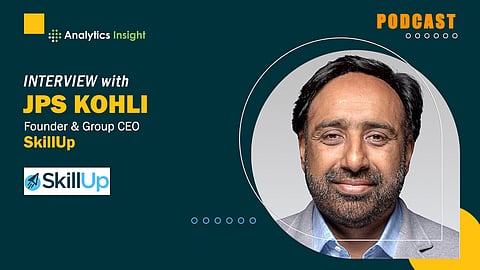

In just a decade, the tech labor force has evolved from a support role to a key growth driver. However, formal training and employee development remain unbalanced, with many companies relying on reactive hiring and sporadic upskilling. While AI enhances learning and evaluation, it also facilitates smart talent ecosystems that predict skills shortages and adapt to the future digital economy.
In this episode of the Analytics Insight podcast, host Priya Dayalani speaks to JPS Kohli, Founder & Group CEO of SkillUp, who insists that the future of work is not defined by tools alone, but by the intelligence within learning systems. “AI won't reshape talent by itself,” he remarks. “Smart learning ecosystems will.”
Kohli believes that most enterprises still chase, rather than prevent, talent shortages. It is, as he puts it, “like building a digital enterprise without preparing the workforce to run it.” Rapid innovation cycles, siloed processes for human resources, and uneven learning pathways hinder productivity and slow digital transformation, issues reflected by the fact that only 16% of leaders feel confident about their tech workforce.
The next era belongs to AI-led learning ecosystems that predict future skill needs. Intelligent adaptive learning is driven by the model of SkillUp, which includes services from strategy consulting to content creation and AI-powered platforms. The professionals can get rid of the conventional training thanks to the AI-assisted assessments, customized skill pathways, and hybrid mentoring that are all part of the model. “Once learning becomes intelligent,” Kohli says, “capability accelerates, productivity rises, and businesses scale faster.”
AI no longer serves only to make training more efficient but drives a truly proactive workforce strategy whereby human strengths and machine intelligence are in alignment. “When learning is orchestrated,” the SkillUp CEO explains, “you don't fight skill gaps-you build resilience, agility, and long-term employability into every role.”
Kohli also points out five pillars for the future of workforce transformation:
Early prediction of skills needed.
Amplify human capability with AI.
Deliver adaptive, personalized learning at scale.
Prioritizing governance, ethics, and responsible skilling.
Leverage partnerships to accelerate innovation.
Success in upskilling today is not merely about course completion; it's about career mobility, business continuity, and sustained innovation. “Each skill gained, each career unlocked,” Kohli says, “turns learning into a strategic advantage.”
With the advancement of AI-powered learning systems, businesses will shift their focus from hiring employees only when needed to the gradual, continuous development of the employees they already have.
According to JPS Kohli, “Organizations that catch the wave of smart upskilling at the very start will be the ones in the best position to take over the digital economy later on, which will be supported by more intelligent, quicker, and future-ready workers.”
